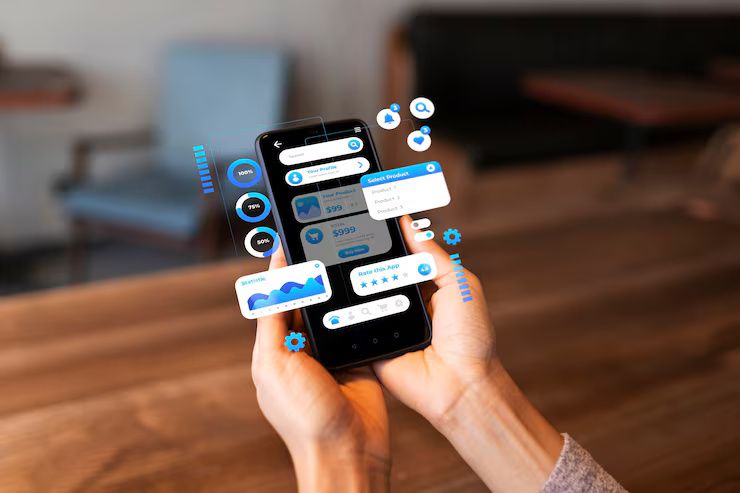Artificial Intelligence (AI) has become a core component of mobile technology, shaping how users interact with their smartphones. From personalized recommendations and voice assistants to real-time translations and content creation, AI is behind many mobile experiences that feel intuitive and efficient.
AI apps leverage machine learning, computer vision, and natural language processing to enhance daily tasks like photo editing, language translation, health tracking, note-taking, and more. As mobile processors grow more powerful, these applications are increasingly running on-device, offering faster, more secure, and personalized features.

Importance
AI apps have shifted mobile usage from passive browsing to smart, context-aware functionality. This matters for several reasons:
-
Personalized User Experiences: AI apps learn user behavior to offer custom recommendations, reminders, and content.
-
Improved Productivity: Apps assist in summarizing emails, automating schedules, and translating on the go.
-
Creative Empowerment: Users can create videos, enhance images, and write content using AI-based tools.
-
Accessibility and Inclusion: Features like real-time captions, voice typing, and visual recognition assist people with disabilities.
-
Health Monitoring: AI-powered apps provide insights into sleep, fitness, and mental wellness through data analysis.
These apps benefit a wide range of users—from students and professionals to creatives and entrepreneurs—enabling smarter interactions, faster results, and greater personalization.
Recent Updates
In the past year, AI mobile apps have seen rapid innovation:
| Date | Update |
|---|---|
| Jan 2025 | Google Gemini integrated into Android for context-aware suggestions |
| Feb 2025 | Microsoft Copilot mobile app launched with Office integration |
| Apr 2025 | OpenAI released ChatGPT Voice Mode and image features on mobile |
| June 2025 | RunwayML’s Gen-3 launched for mobile video generation |
Other trends include:
-
Rise of AI-powered photo apps like Remini and Lensa
-
AI-based transcription apps like Otter.ai gaining popularity for students and meetings
-
Mobile video editing enhanced by AI with apps like CapCut and InVideo
These developments emphasize AI’s shift from backend support to frontline, user-facing innovation in mobile devices.
Laws or Policies
The widespread use of AI apps on mobile devices is also drawing regulatory attention. Countries are introducing frameworks to ensure ethical use, data protection, and algorithmic transparency:
-
GDPR (Europe): Mobile apps using AI must obtain clear consent for data use and explain automated decision-making.
-
Digital India Act (Draft, 2025): Emphasizes AI transparency, especially for apps collecting personal information.
-
AI Act (EU): Proposed rules categorize AI systems by risk; apps involving biometrics or profiling may face stricter scrutiny.
-
California Consumer Privacy Act (CCPA): Requires businesses to disclose what personal data is collected and how it is used, including AI-based analytics.
Developers and platforms offering AI mobile apps must prioritize user privacy, consent, and clarity in how data powers personalization. Some platforms now also provide users the ability to turn off AI-based recommendations or data tracking.
Tools and Resources
Several mobile AI apps stand out in their respective categories. Here’s a categorized overview of top performers:
Productivity and Assistance
-
ChatGPT Mobile App – AI writing, summarizing, planning
-
Otter.ai – Real-time transcription for meetings and lectures
-
Grammarly Keyboard – AI writing assistance while typing on mobile
-
Notion AI – Summarizing and idea generation within notes and databases
Creativity and Media
-
Lensa AI – Artistic selfies and portrait editing
-
Remini – Photo enhancement using generative AI
-
CapCut – AI-driven video editing for reels, TikTok, YouTube
-
Runway ML – AI video generation and editing
Language and Communication
-
Google Translate – AI-powered text, voice, and image translation
-
iTranslate – Real-time language translation for travelers
-
Speechify – AI text-to-speech for reading documents on mobile
Health and Lifestyle
-
Fitness AI – Personalized workout routines using machine learning
-
Sleep Cycle – AI-powered sleep tracking and analysis
-
Replika – AI companionship and mental wellness support
These tools are available for both iOS and Android, with free versions and optional premium upgrades. Many apps use on-device processing, ensuring faster performance and enhanced privacy.
Frequently Asked Questions
1. Are AI apps safe to use on mobile devices?
Yes, most popular AI apps follow privacy regulations and offer encrypted data handling. However, users should review permissions and privacy settings regularly to stay informed.
2. Do AI apps consume more battery or data?
Some AI apps, especially those using cloud processing or real-time analytics, may use more battery or data. Apps optimized for on-device processing (e.g., ChatGPT on iOS) tend to be more efficient.
3. Can AI apps work offline?
A few apps offer offline features (like Google Translate’s downloadable language packs), but most require an internet connection for full functionality due to cloud-based models.
4. How do I know if an app is truly AI-powered?
Check the app’s documentation or about section. True AI apps use machine learning for decision-making, content generation, or real-time processing. Many also mention partnerships with AI platforms like OpenAI or Google AI.
5. Are there AI apps for kids or education?
Yes, apps like Duolingo, Khan Academy Kids, and Quillionz use AI to personalize learning experiences. However, parental supervision is recommended to ensure safety and relevance.
Final Thoughts
AI apps are reshaping how we use our mobile devices—making them smarter, more responsive, and highly personalized. Whether you're writing emails, editing photos, learning a language, or tracking your sleep, AI adds layers of intelligence that save time and enhance quality.
As innovation continues, we can expect even more intuitive, voice-driven, and multimodal experiences on mobile. Staying aware of legal policies, choosing secure apps, and using tools ethically will ensure these technologies continue to benefit users responsibly.
